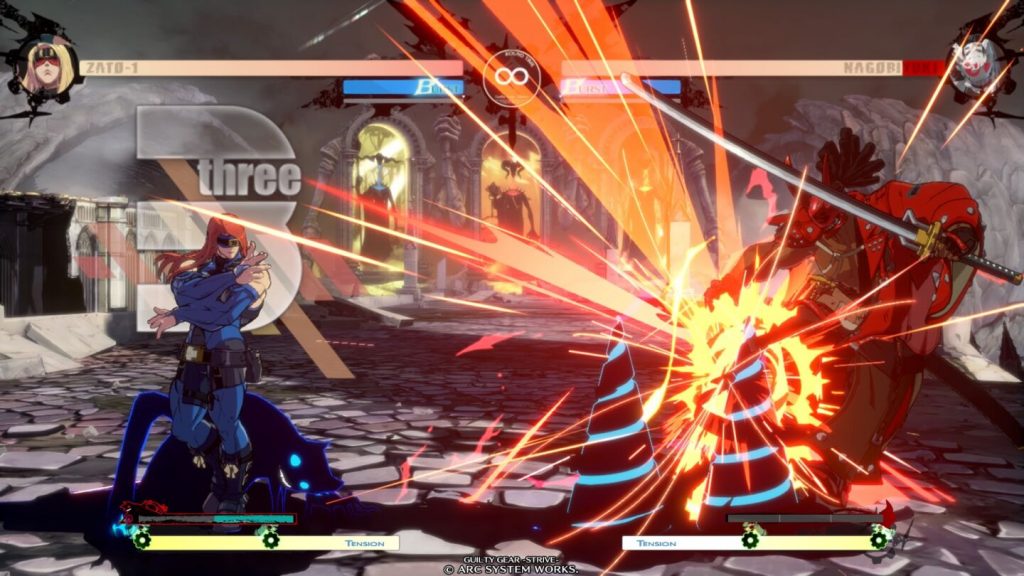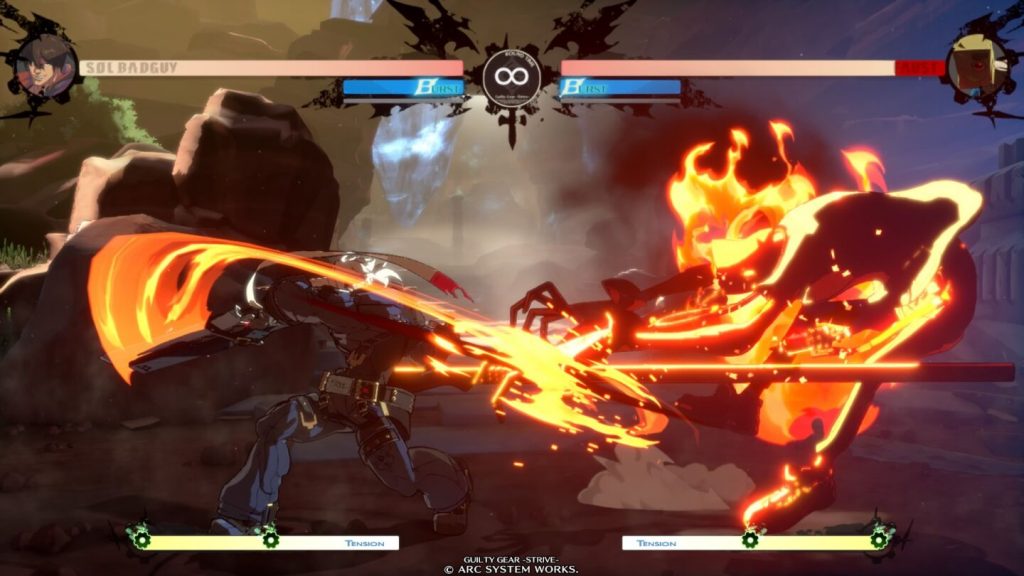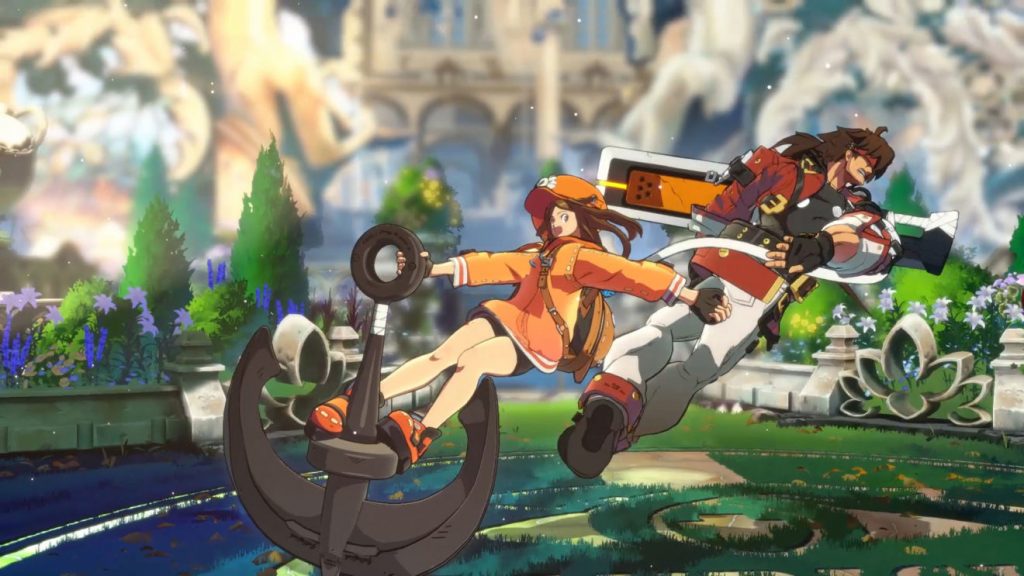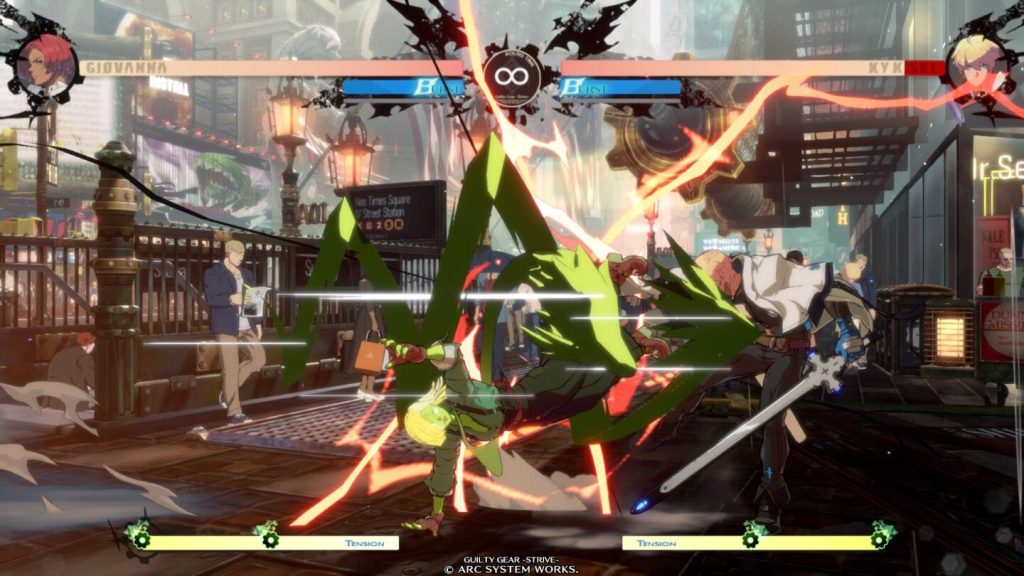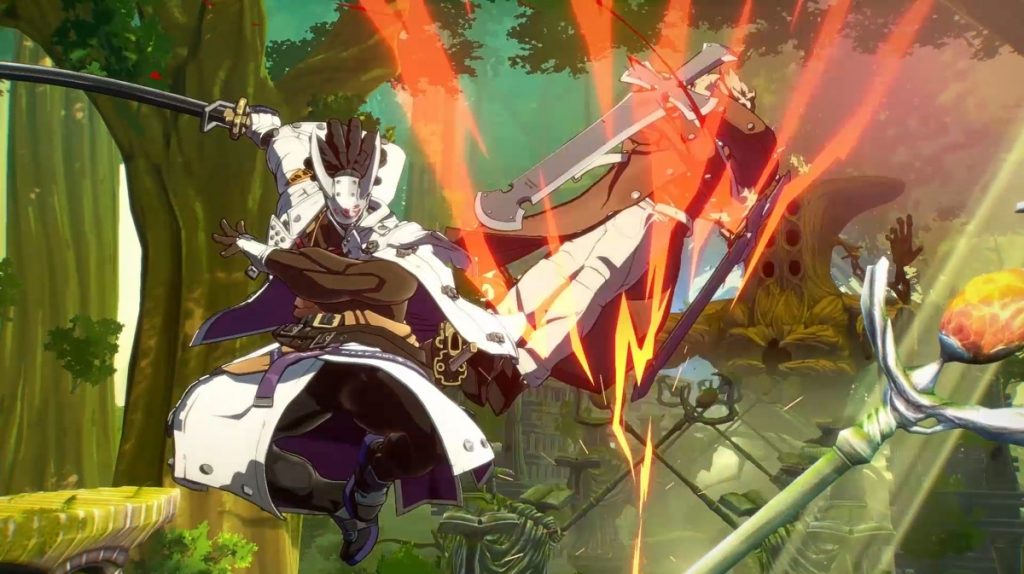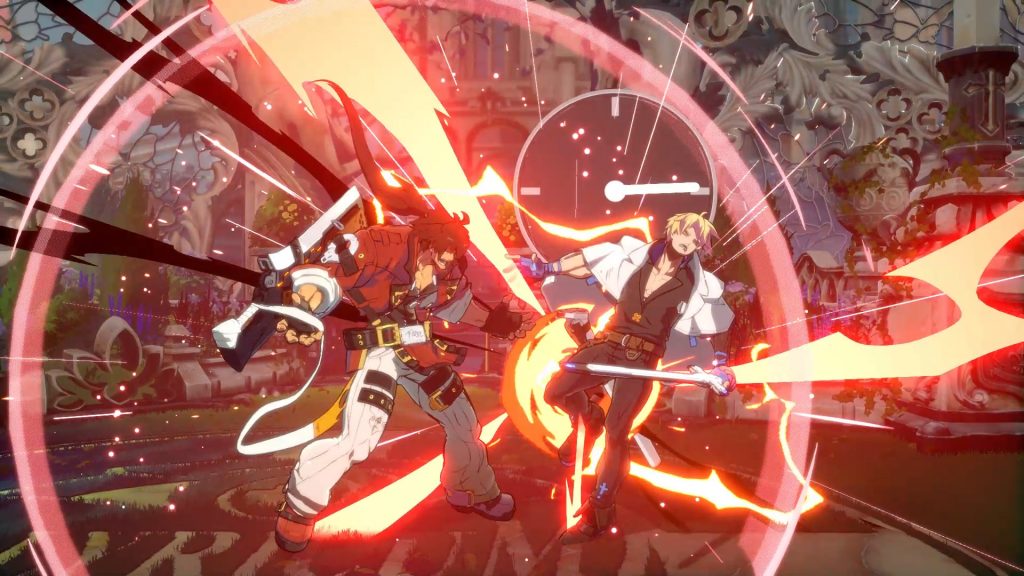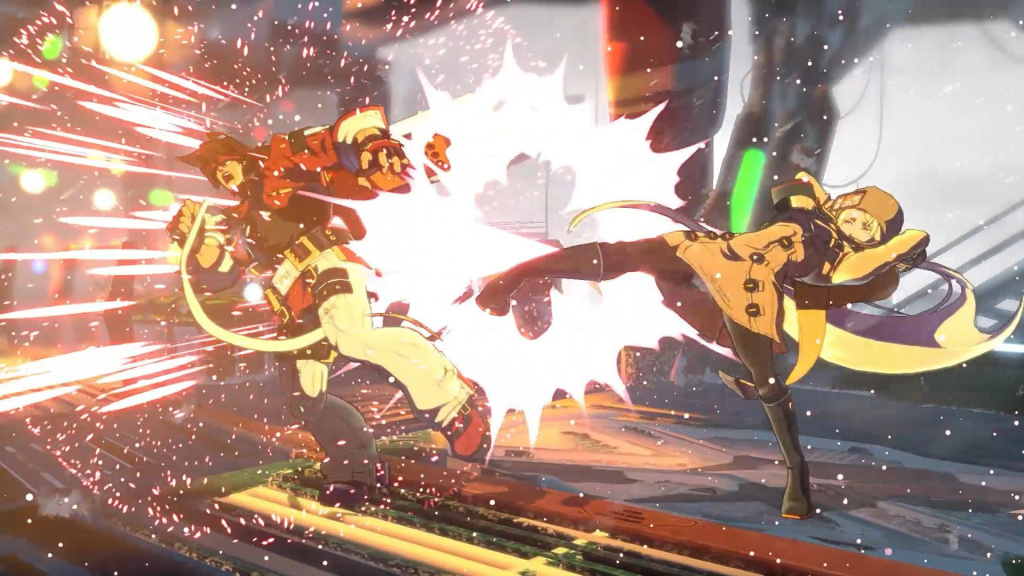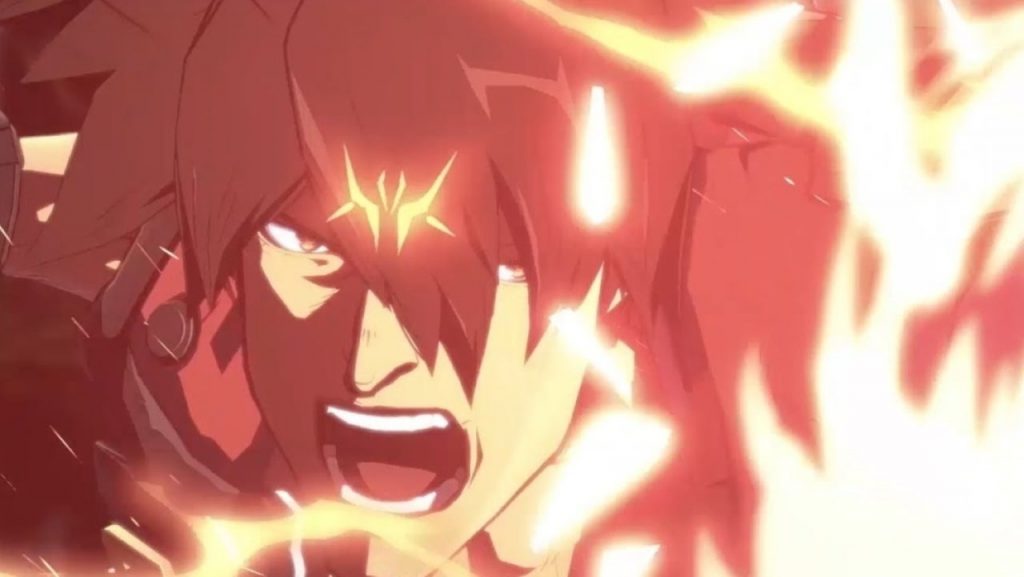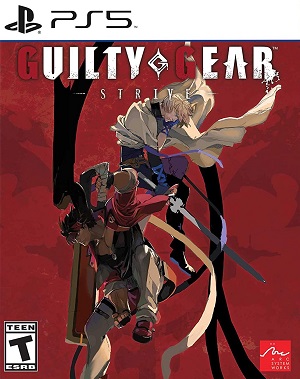
If you’re a fan of fast and furious fighting games, you’ve no doubt been following the latest from Arc Systems Works’ newest game in the classic Guilty Gear series, Guilty Gear Strive. An open beta launched on February 17th on PS4 and PS5, but I got to sit down with the beta test a few days earlier, and I came away with some impressions of the game, including what’s new and what’s changed since the last beta, and in the franchise overall. Here’s what I learned:
1. Rollback Netcode
Much has been made of Arc System Works’ decision to use rollback netcode for Strive. Most fighting games used delay-based netcode, which works fine over short distances and fairly well in private lobbies, but tends to fall apart if you’re trying to play someone a long way away, especially internationally.
Rollback doesn’t have these issues, and generally works better, but most Japanese fighting game developers have opted to stick with delay-based netcode. Arc Systems Works’ decision has paid off big time, however. In my time with the beta, matches were incredibly smooth, no matter where my opponent was. Playing someone in California while you’re in New York with only a frame or two of delay is incredible, and it’s going to make going back to delay-based fighters a lot harder.
2. Strive Punishes You for Mashing
While earlier Guilty Gear games allowed you to mash out most combos, which made confirming more complicated combos easier, Strive doesn’t. Mashing in Strive will knock your opponent backwards and out of your combo, making follow-up moves impossible and negating any potential for greater damage.
Fear not, though, there is a trick to getting around it. Delaying your button presses slightly will allow you to keep your combo together. There’s a fine balance here, and it’s different depending on which character you’re using and which move it is. Delay too much, and you’ll give your opponent a chance to block, but move too quickly, and you’ll be back to neutral.
3. Small Combos, Big Damage
Guilty Gear’s old gatling system allowed you to chain punch into kick into slash into heavy slash and finally into dust, making basic combos pretty easy. The gatling system also made longer combos possible. Guilty Gear’s reputation for technical depth was in-part based on the insane combo options the series offered, but Strive does away with that in favor of shorter, more damaging combos, which should be easier for new players to learn.
The gatling system has also changed. Now, most combos start from slash, meaning combo options are more limited. That’s not to say there’s no room for stylish combos here; you can still do them, provided you know how, but you won’t see anything like what you saw in earlier games.
4. The New Throw System Works Well
In previous Guilty Gear games, you threw other characters by pressing forward or backward and heavy slash while you were close to them. The downside of this system is that throws could be tricky compared to other fighting games; Guilty Gear didn’t have a dedicated throw button, and if you missed a throw, you’d usually end up doing a move you didn’t mean to – though in certain cases, it was actually a good thing.
Strive solves that problem by mapping throw to forward or backward and dust. In addition, missing a throw now performs a missed throw animation, making Strive’s systems a bit more like other fighters – and punishing you when you whiff a throw.
5. Dust Ability
In addition, the dust ability has also seen a bit of an overhaul. In Guilty Gear Xrd, dust would knock an enemy either up in the air or sideways, allowing you to follow up for a big combo. Now, dust only does that if you hold the button down – just pressing it will get you a single attack. Combo possibilities have been shortened here, too, and there’s a bit of an auto-combo function. Pressing any button twice after executing a dust will perform a quick combo that knocks the opponent back down to earth. Like other games with an auto-combo system, you can press different buttons to customize your moves here, but you’re still more limited than you were in previous Guilty Gear games.
6. Meter Comes at a Premium
Even simple combos hit really, really hard in Strive, so matches are fairly short, meaning you won’t have many opportunities to build a lot of tension meter in a round. Use your meter wisely, but don’t be afraid to spend it; it resets between rounds, so you can’t take it with you.
7. The New Characters Fit in Well
So far, only two of Strive’s characters are new, with twelve returning from previous games – welcome back, Anji! – and one still left to be revealed. Giovanna is a rushdown character whose moves remind me a bit of Juri from Street Fighter. She excels at getting in the opponent’s face and delivering quick, powerful strikes. In battle, she uses a spirit wolf named Rei to help her out, and she has a unique mechanic where she does more damage as she builds tension (super meter).
Ngaoriyuki Is a vampire samurai with a big sword. His unique mechanic is the blood gauge. When it’s full, he enters blood rage, which gives certain attacks more range and grants access to the powerful Zanzetsu special move. The downside is he takes damage as long as he’s in blood rage, and loses access to his other special moves. He’s got good range and fairly high damage, and his unique mechanics mean he’ll be an interesting addition to the cast.
8. The New Roman Cancel System is Pretty Deep
Guilty Gear’s signature Roman Cancel system has also seen an overhaul. The basics are still the same; by spending half of your tension meter, you can cancel any move, allowing you to continue a combo or get yourself out of trouble at the last second. In Strive, Roman Cancels done during combos (or Red Roman Cancels) now actually hit the target, extending your combo automatically. If you want to avoid that, you can skip it by immediately pressing a button after you Roman Cancel, and that attack will come out instead. In addition, Roman Cancels can be done during jumps and dashes, allowing your character to “shift” in any of the four cardinal directions, opening up more movement and combo possibilities.
9. You Might Only Unlock Collection Items by Fishing
In Guilty Gear Xrd, you could unlock art, music, voice lines, new colors, and several other pieces of content by buying them directly in the game’s collection. You could also spend a set amount to fish for an item, though what you’d get would be random. Strive’s menu descriptions imply fishing will be the only way to unlock everything. We could be wrong, but if we’re not, be ready to spend a lot of time by the pond.
10. There are Still no Instant Kills
While each of Strive’s character has gotten new moves and seen modifications to their old ones since the last beta, instant kills are still missing in action. In previous games, each character could enter an instant kill mode by pressing punch, kick, slash, and heavy slash at the same time. Once in the mode, they could preform an instant kill attack. If it hit, it would immediately end the round, no matter how much health your opponent had left. Missing the attack, however, would cost you your tension gauge until the next round. Tension would drain from your gauge as long as you stayed in the mode, and running out of tension would start to drain your health.
In Strive, there’s no sign of any Instant Kill moves. We hope they’ll make it into the final game, but as of now, they’re simply not there.
It’s worth noting that this is a beta, and all of this might change between now and release. Right now, however, Strive is shaping up to be a very unique entry in the franchise: one that’s more accessible for newcomers, while retaining what seems like a good chunk of the depth of the older games. After several hours, and a couple hundred beta matches, however, I think there’s a lot for Guilty Gear fans to be excited about. We’ll find out when Guilty Gear Strive releases for PC, PS4, and PS5 on April 9th, 2021.








